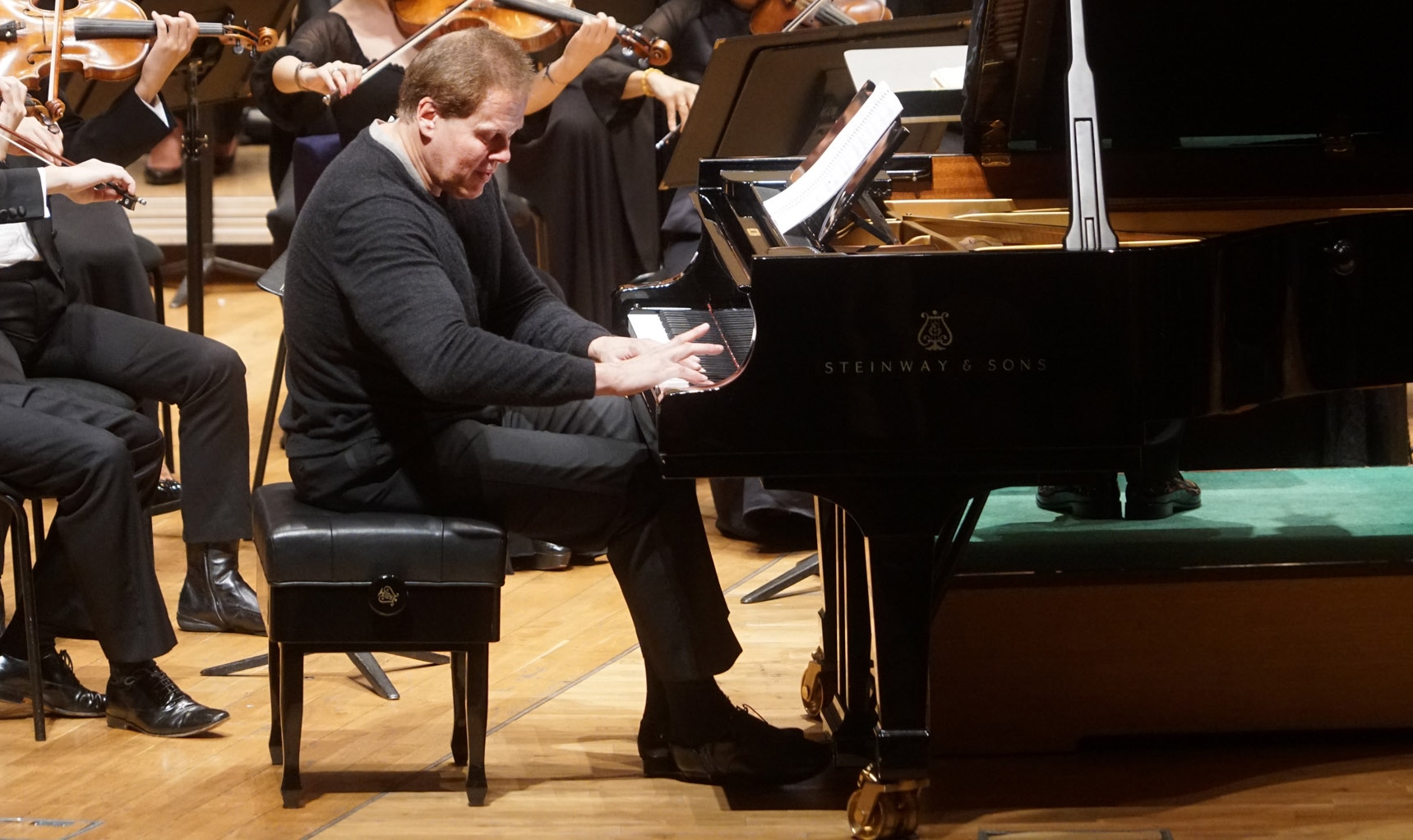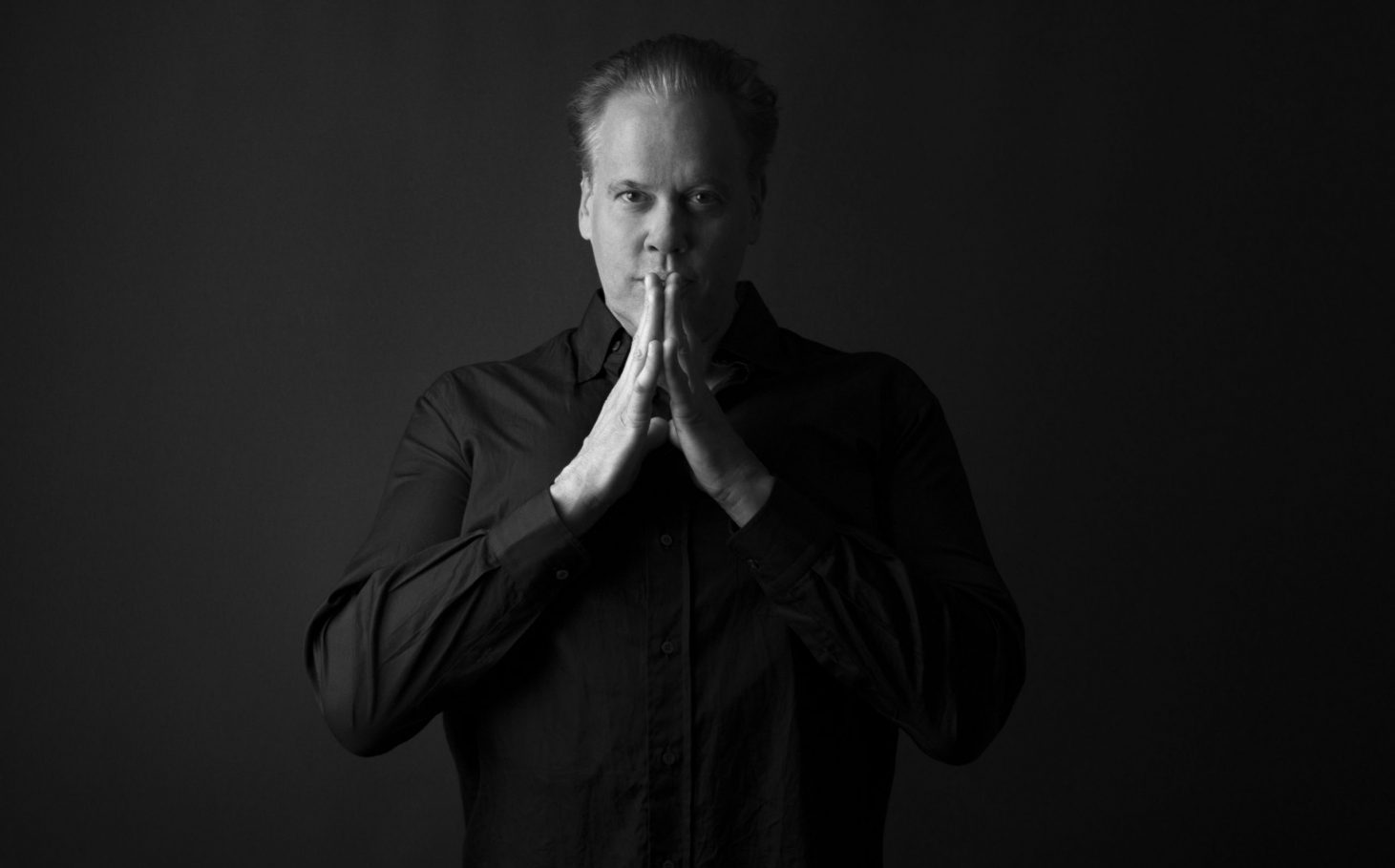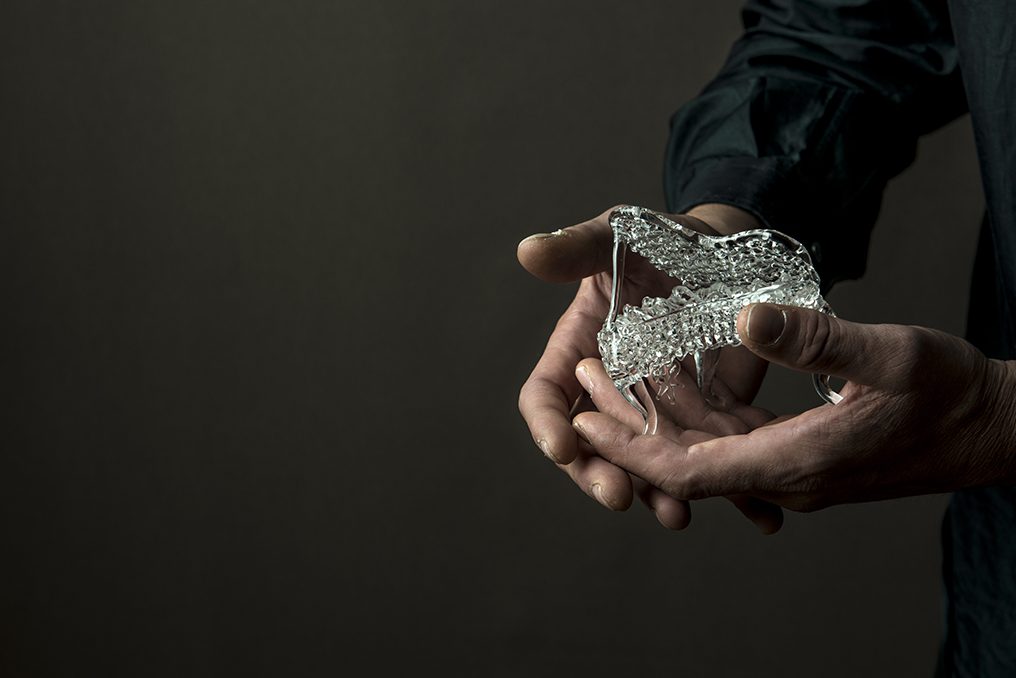Lübeck: “8th Symphony Concert”, Bernstein, Gershwin, Rachmaninov
“Today he [Tzimon Barto] shows in Gershwin’s “Concerto in F” all his talent in speed, exactness and passionate devotion, coupled with sovereign nonchalance. He and Vladar repeatedly enter into direct contact; the chemistry is right there and it works out in natural harmony, especially with the extensive orchestra in its rich instrumentation. […]
This concerto is simply fun and yet also has its elegiac, melancholy passages. Barto’s joyful pedal-playing creates a distinct but never slurred sound that reverberates the grand gesture of the corresponding sequences. His trills are as controlled as they are lightly sparkling, and in the solo parts he minimizes the frothing dynamics to the finest intimacy.”
Der Opernfreund, 21.05.2023, Andreas Ströbl
Tzimon Barto, Gershwin Concerto in F, Philharmonisches Orchester der Hansestadt Lübeck, Stefan Vladar
As if behind a veil of gauze
“Tzimon Barto is the soloist in the Pfalzbau in Ludwigshafen. He chooses a slow tempo for the opening bars, perhaps in order to sharpen the transition to the expressive thrusts that follow. Accompanied by the splendid orchestra, Barto moves with technical brilliance and expressively between emotionality and distanced calculation. Always with an eye on the inner logic of form, from which rhythmic, melodic and harmonic connections and contexts arise.”
Die Rheinfalz, 23.01.2023, Uwe Rauschelbach
Tzimon Barto, Brahms 2nd Piano Concerto, Deutsche Staatsphilharmonie Rheinland-Pfalz, Michael Francis
Poet of sounds with an unconventional touch
“Haydn’s three-movement Sonata in A-flat major (Hob. XVI:46) was taken by Tzimon Barto with pianistic elegance and lyrical nobility. Ornamentation remained clear, the outer movements took on a richness of nuance that grew into narratives of sound. The poet Barto showed especially how much it is always worthwhile to free Haydn’s piano works from their shadowy existence when he translated the slow, quietly flowing middle movement into his own universal tonal language. Barto emphasized the strength of delicate tones and drew sonic pictures of floating beauty.”
Hannoversche Allgemeine Zeitung, 27.04.2022, Birgit Jürgens
Tzimon Barto, Recital
Each chord is an exclamation point
“You cannot ignore any of its notes. […] Barto’s madly virtuosic, crystal clear, sometimes brutally transparent way of playing suits these explosions of the subconscious, which one cannot escape.”
Nürenberger Nachrichten, 29.01.2020, sar
Tzimon Barto, Prokofiev Piano Concerto No. 3 C major, op.26, Deutsche Staatsphilharmonie Rheinland-Pfalz, Michael Francis
With wafting romantic impetus
“Barto’s performance was powerfully resilient, gently and untiringly forming the interplay between piano and orchestra… A fascinating time, never routine, with standing ovations.”
Allgemeine Zeitung Mainz, 08.10.2019, Manuel Wenda
Tzimon Barto, Brahms Piano Concerto No. 2, Philharmonisches Staatsorchester Mainz, Hermann Bäumer
Something very precious
“The spectacular highlight of the concert was the appearance of the American pianist Tzimon Barto. His hefty Bartók Second Piano Concerto became the event. Barto inexorably hammered the intricate rhythms, sometimes even with his fist on the keys one moment, and the next produced tremendous delicacy, which one would hardly have expected given his muscular form.”
Hannoversche Allgemeine Zeitung, 01.12.2018, Stefan Arndt
Tzimon Barto, Bartók Piano Concerto No. 2, NDR Radiophilharmonie, Christoph Eschenbach
HK Phil/Christoph Eschenbach/Tzimon Barto – contrasts abound in evening of Brahms and Dvorak
“Barto’s gentle and reflective answer to the opening horn call in the first movement Allegro non troppo began careful unravelling of instrumental interplay, alluding to omnipresent drama. Powerful chordal playing from Barto in the unusually early cadenza was cleverly contrasted with his subsequent use of extremely hushed pianissimo and, despite the movement’s intermittent outbursts of passion, the overall mood of serenity and calmness remained intact.”
South China Morning Post, 09.10.2017, Christopher Halls
Tzimon Barto, Brahms Piano Concerto Nr. 2, B major op. 83, Hong Kong Philharmonic Orchestra, Christoph Eschenbach
Two Orchestras in Search of a Sound
“The slow movement sounded beautiful, as if played on clouds, and the fireworks of the Finale Barto, a narrator at the piano, brought to sing. Liszt’s Hungarian Rhapsody was he encore. It would be exciting to hear Barto in a solo piano evening in Dortmund.”
Ruhr News, 13.11.2016, Julia Gass
Tzimon Barto, Ravel Piano Concerto G major, SWR Sinfonieorchester, Christoph Eschenbach
Magician on the Keyboard – Tzimon Barto at the Staatsphilharmonie Nürnberg
“His cultured pianissimo is breathtaking, which was confirmed later in the encore with Chopin’s Nocturne in C sharp minor, the jeu perlé traunwandlerisch and the desire to attack unabated: Themagic of Barto’s performance has lostnone of its fascination. The audience in the well-attended Meistersingerhalle was spellbound and applauded tremendously.”
Nürnberger Nachrichten, 24.10.2016, Jens Voskamp
Tzimon Barto, Liszt Piano Concerto No. 2 A major S. 125, Nürnberger Philharmoniker, Péter Halász
Late Summer Performance
“The Philharmonic with Rihm and Bruckner “The string section was transparent, the small brass section got beautiful solos. And almost throughout the soft dynamics, Tzimon Barto’s sensitive fingers nestled into the instrument. He entwines into a floral first slow movement, dreaming away in fin-de-siècle chromaticism, then floats away through a humorously relaxed rondo.”
Süddeutsche Zeitung, 27.03.2015, Michael Stallknecht
Tzimon Barto, Liszt Piano Concerto No 2 A major S. 125, Württembergische Philharmonie Reutlingen, Alexander Soddy
His St. John Passion
“In the Andante of the Second Piano Concerto, a wonderfully intimate dialogue with the singing solo cello is created, and in the finale Barto selects a delicate, fragrant attack as if it were ballet music by Tchaikovsky, feeling his way cautiously forward like a skater checking the fresh ice before he turns his pirouettes.”
Der Tagesspiegel, 25.12.2014, Frederik Hanssen
Tzimon Barto, Brahms Piano Concerto (CD) , Deutsches Symphonie-Orchester, Christoph Eschenbach
Honoring Claudio Abbado – The Gustav Mahler Youth Orchestra plays Rihm and Tchaikovsky in the Laeiszhalle
“Rarely has one experienced a piano part so brushed free of effect, and Barto never pushed himself into the foreground. He listened to every bow and fused the timbre of his instrument with those of the solo wind players and solo violinists.”
Hamburger Abendblatt, 30.08.2014
Tzimon Barto, Rihm Piano Concerto No. 2, Gustav Mahler Jugendorchester, Christoph Eschenbach
All Together for a Composer
“Rihm let Tzimon Barto stroke the keys for the long introduction of the two-part concerto, almost tenderly framed by the colorful, equally gentle dazzling orchestral sound. Even if the pianist does have running fingers for the silvery, brilliant piano part over the entire keyboard, he is unlikely ever to use real power. The finely structured, witty, chamber music piece is downright sensual “feel good music” in the best sense of the word, without Rihm worshiping. Accordingly, the audience celebrated everyone, including Wolfgang Rihm.”
Salzburger Nachrichten, 27.08.2014, Ernst P. Strobel
Tzimon Barto, Rihm Piano Concerto No. 2, Gustav Mahler Jugendorchester, Christoph Eschenbach
Klangdenken – A new piano concerto by Wolfgang Rihm
“Lastly, there is this incredible glow. With the dance-like pleasure with which pianist Tzimon Barto played for half an hour without interruption through the ramifications of Wolfgang Rihm’s new piano concerto, he also suggests the lonely, dying final tone. After an alienated, magical D-flat major sound of the strings and a contrasting, seductive A of the harp, the F-sharp in the middle of the keyboard is a summary of the intention of the whole piece: to reconcile lights with laconics, serene seriousness with playful architectonics.”
Süddeutsche Zeitung, 27.08.2014, Reinhard J. Brembeck
Tzimon Barto, Rihm Piano Concerto No. 2, Gustav Mahler Jugendorchester, Christoph Eschenbach


